Topics

Dr. Maximilian Stockhausen
Senior Economist for Social Security Systems and Income and Wealth Distribution
Tel: +49 30 27877 134 Mail: stockhausen@iwkoeln.de Maximilian Stockhausen @StockhausenEcon- At the IW since 2017
- Studies in economics with a focus on finance and econometrics as well as doctoral studies in the research group "Tax and Social Policy with Growing Inequality" at the Freie Universität Berlin
Research unit
IW Publications
Obst, Thomas / Stockhausen, Maximilian, 2024, Makroökonomische Analyse von Lohn-Preis-Spiralen. Risiken von Zweitrundeneffekten in der gegenwärtigen Hochinflationsphase, IW-Analyse, Nr. 155, Berlin / Köln
Zur Studie
Stockhausen, Maximilian, 2023, IW-Verteilungsreport 2023. Einstellungen zur sozialen Mobilität, IW-Report, Nr. 58, Berlin
Zur Studie
Stockhausen, Maximilian, 2022, IW-Verteilungsreport 2022. Einfluss struktureller Veränderungen auf die Einkommensverteilung, IW-Report, Nr. 63, Köln.
Zur Studie
Niehues, Judith / Stockhausen, Maximilian, 2022, Die Mittelschicht im Fokus – Abgrenzung, Entwicklung und Mobilität, in: IW-Trends, 49. Jg., Nr. 2, S. 27-53
Zur Studie
Niehues, Judith / Stockhausen, Maximilian, 2021, An international comparison with a special focus on the case of Germany. Inequality revisited, IW-Report, Nr. 18, Köln / Berlin
Zur Studie
Beznoska, Martin / Hentze, Tobias / Kochskämper, Susanna / Stockhausen, Maximilian, 2019, Die Besteuerung von Ehepaaren in Deutschland. Ökonomische Effekte verschiedener Reformvorschläge, IW-Analyse, No. 133, Köln / Berlin
Zur Studie
Pimpertz, Jochen / Stockhausen, Maximilian, 2019, Grundsicherung statt Grundrente. Eine Frage der Reichweite und Treffsicherheit, in: IW-Trends, 2019, No. 3
Zur Studie
Arbeitsangebotsmodul zum IW-Mikrosimulationsmodell STATS – Dokumentation Version 1.0
IW-Report 13/2019
Ist der Traum vom sozialen Aufstieg in Deutschland ausgeträumt?
IW-Kurzbericht 48/2018
Wie der Vater, so der Sohn? Zur intergenerationalen Einkommensmobilität in Deutschland
IW-Trends 4/2017
Expertises
(in cooperation with Jochen Pimpertz)
Grundrente ohne Bedürftigkeitsprüfung – Wer profitiert ohne Not? – Eine mikrodatenbasierte Analyse potenziell bedürftiger Rentner
Gutachten für die Initiative Neue Soziale Marktwirtschaft (INSM), 2019
(in cooperation with Martin Beznoska, Judith Niehues)
Die Vermögensverteilung im internationalen Vergleich
Gutachten für die Vereinigung der Bayerischen Wirtschaft, 2018
External Publications
Stockhausen, Maximilian, 2021, Like father, like son? A comparison of absolute and relative intergenerational labour income mobility in Germany and the US, in: Journal of Economic Inequality, online first
Zur Studie
Stockhausen, Maximilian, 2019, The Distribution of Economic Resources to Children in Germany, in: Journal of Income Distribution, 28. Jg., Nr. 1, S. 1-36
(in cooperation with Guido Neidhöfer)
Dynastic Inequality Compared – Multigenerational Mobility in the United States, the United Kingdom and Germany
Article in the Review of Income and Wealth, 2018, 65. Jg., Nr. 2, S. 383-414
(in cooperation with Charlotte Bartels)
Children’s Opportunities in Germany – An Application Using Multidimensional Measures
German Economic Review, Vol. 18, Issue 3, 2017, S. 327–376
More from Dr. Maximilian Stockhausen
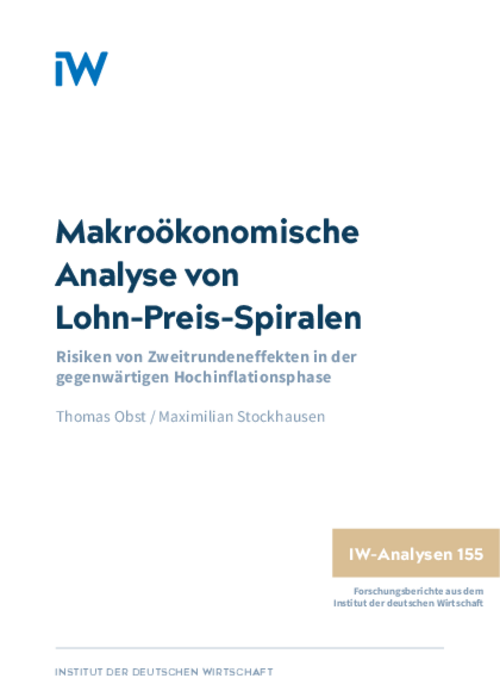
A Macroeconomic Analysis of Wage-Price Spirals
The subject of this Analysis is the forms that wage-price spirals can take and how they influence macroeconomic stability and inflationary trends in Germany.
IW
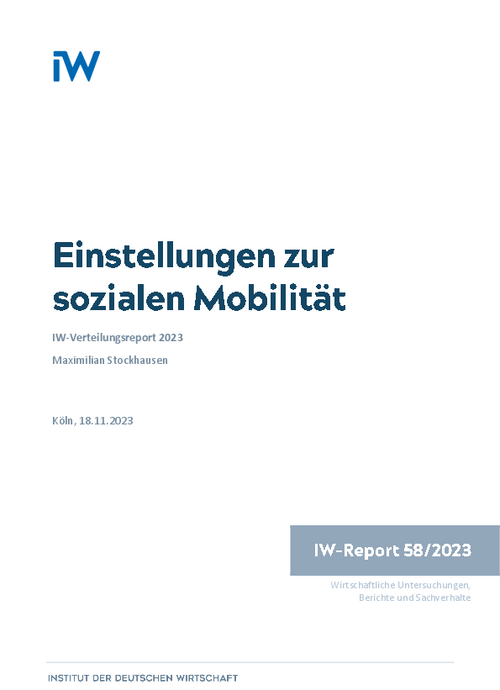
IW Distribution Report 2023: Attitudes towards social mobility
Fundamentally linked to the social market economy is the idea that everyone has the opportunity for social advancement, regardless of their social background, and that children should be better off than their parents.
IW
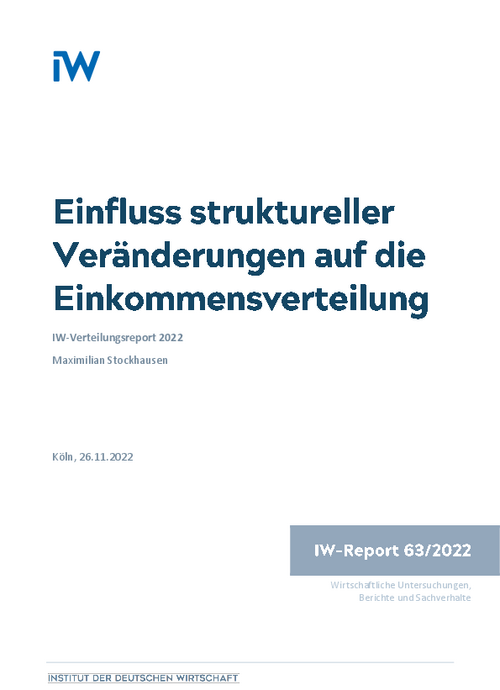
IW Distribution Report 2022: Influence of structural changes on income distribution
Academization, immigration and demographic change are defining issues of our time and influence the distribution of income. This year's report therefore focuses on the question of which long-term structural changes in the net income distribution are associated with a higher average level of education, increased net immigration and a higher share of older fellow citizens in the total population.
IW
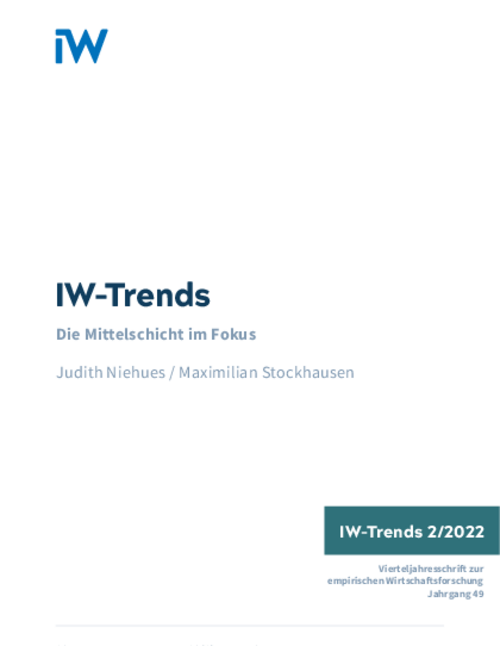
A Focus on the Middle Class - Demarcation, Development and Mobility
In 2018, roughly every second German was a member of the middle class as measured by income, a proportion which has barely changed for more than a decade. However, the lower income threshold of this middle-income group has risen - an indication of increased prosperity.
IW
Like father, like son?: A comparison of absolute and relative intergenerational labour income mobility in Germany and the US
Are children better off than their parents? This highly debated question in politics and economics is investigated by analysing the trends in absolute and relative intergenerational labour income mobility for Germany and the US.
IW
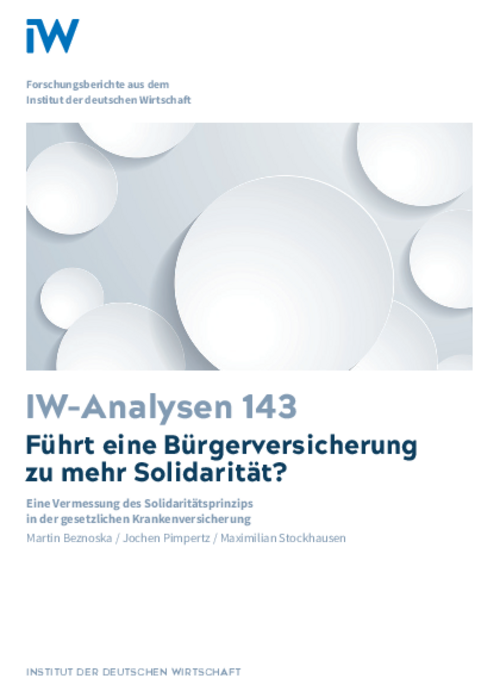
Would universal health insurance lead to more solidarity?
The principle behind Germany’s statutory health insurance (SHI) system, into which all employees up to a certain income threshold are obliged to pay a per¬centage of their earnings, is one of solidarity.
IW
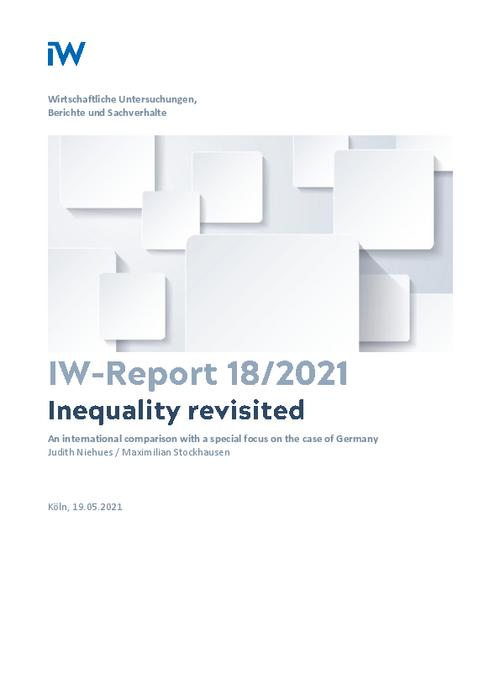
Inequality Revisited: An International Comparison with a Special Focus on the Case of Germany
This report summarizes the latest findings on the development and levels of global income and wealth inequality and puts special emphasize on the situation in Germany.
IW
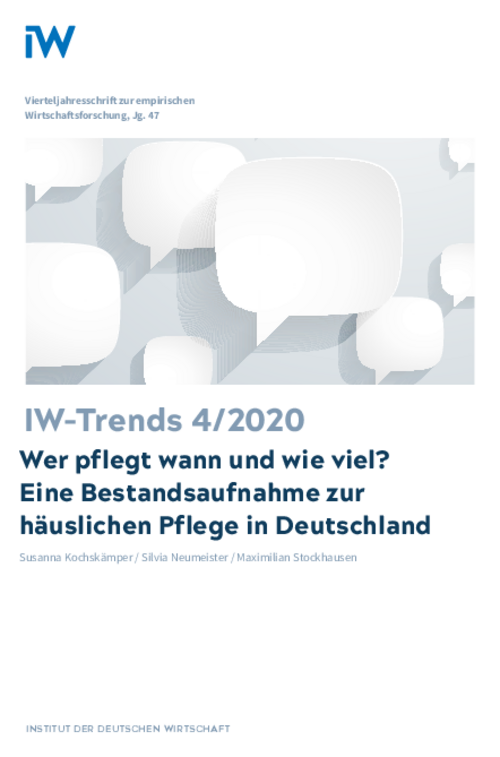
Who Nurses When and How Much?: An Inventory of Home Nursing Care in Germany
German society is ageing and the need for nursing care is increasing. In 2017, just under 5 million people claimed to be providing nursing care in a private setting. An analysis of the data from the Socio-Economic Panel provides a heterogeneous picture of how the home care burden is shared.
IW
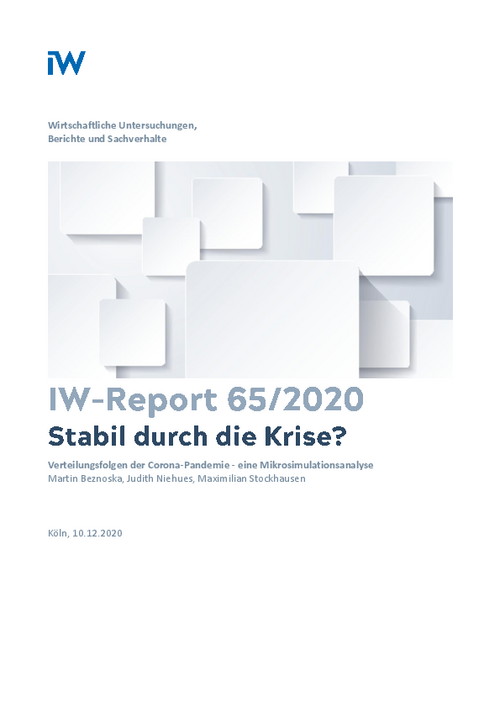
Stable Through the Crisis?: Distributional Consequences of the Corona Pandemic - A Microsimulation Analysis
The corona pandemic has had a decisive impact on the year 2020 and, at least in recent times, has had an unprecedented (negative) impact on society and the economy. At the core of this simulation study is therefore the question of how the corona pandemic has affected income levels and social inequality in Germany, and to what extent automatic stabilizers of the social security system and additional financial aid measures have been able to cushion distortions caused by the crisis.
IW
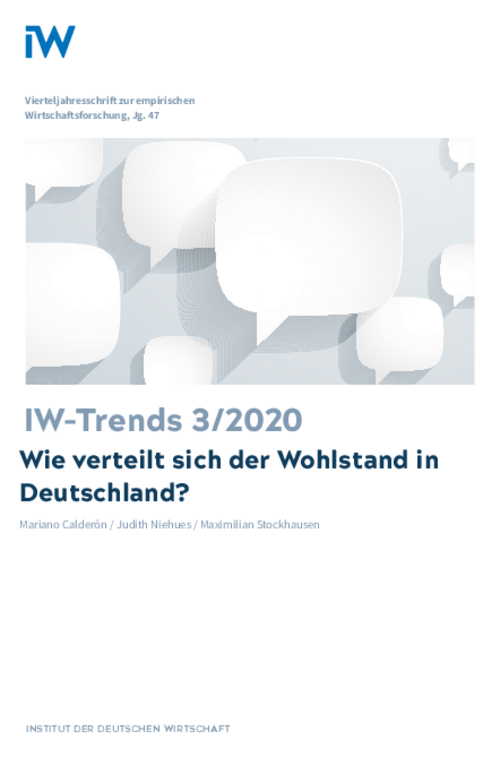
How is Prosperity Distributed in Germany?
Distributional analyses often focus on either income or wealth. However, a comprehensive picture of the material well-being of a nation’s households can only be obtained by considering both variables together.
IW